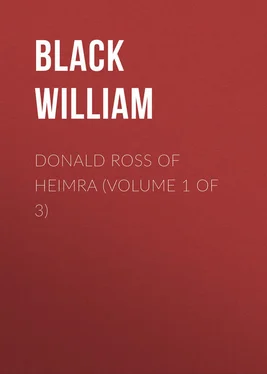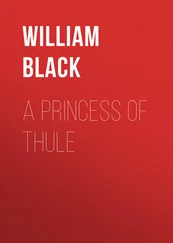William Black - Donald Ross of Heimra (Volume 1 of 3)
Здесь есть возможность читать онлайн «William Black - Donald Ross of Heimra (Volume 1 of 3)» — ознакомительный отрывок электронной книги совершенно бесплатно, а после прочтения отрывка купить полную версию. В некоторых случаях можно слушать аудио, скачать через торрент в формате fb2 и присутствует краткое содержание. Жанр: foreign_antique, foreign_prose, на английском языке. Описание произведения, (предисловие) а так же отзывы посетителей доступны на портале библиотеки ЛибКат.
- Название:Donald Ross of Heimra (Volume 1 of 3)
- Автор:
- Жанр:
- Год:неизвестен
- ISBN:нет данных
- Рейтинг книги:4 / 5. Голосов: 1
-
Избранное:Добавить в избранное
- Отзывы:
-
Ваша оценка:
- 80
- 1
- 2
- 3
- 4
- 5
Donald Ross of Heimra (Volume 1 of 3): краткое содержание, описание и аннотация
Предлагаем к чтению аннотацию, описание, краткое содержание или предисловие (зависит от того, что написал сам автор книги «Donald Ross of Heimra (Volume 1 of 3)»). Если вы не нашли необходимую информацию о книге — напишите в комментариях, мы постараемся отыскать её.
Donald Ross of Heimra (Volume 1 of 3) — читать онлайн ознакомительный отрывок
Ниже представлен текст книги, разбитый по страницам. Система сохранения места последней прочитанной страницы, позволяет с удобством читать онлайн бесплатно книгу «Donald Ross of Heimra (Volume 1 of 3)», без необходимости каждый раз заново искать на чём Вы остановились. Поставьте закладку, и сможете в любой момент перейти на страницу, на которой закончили чтение.
Интервал:
Закладка:
"Down foresail!" he called to the men. For now they were passing a headland that formed one of two arms encircling a sheltered little bay – a strangely silent and solitary-looking place it seemed in this mysterious light. Sterile, too; tumbled masses of rock with hardly a scrap of vegetation on them; a few clumps of birches here and there; an occasional dark green pine higher up the cliffs. But at all events it was quiet and still; the water lapped clear and crisp along the shingle; while the murmur of the outer sea was still everywhere around, and also, on the northern side of the bay, there was a long out-jutting reef where there was a continuous surge of white foam over the saw-toothed edge.
"Down jib!" The sound of a human voice was so strange in this solitude – far stranger than the mere rattle of blocks and tackle.
"Main sheet!"
The two men came aft: the steersman jammed down his helm; the vessel slowly rounded into the wind – the boom being hauled in meanwhile – the mainsail flapping and shivering in the light breeze.
"Stand by to let go!" was the next order; and the hands went forward again – the vessel gradually losing the way that was on her, until she seemed absolutely motionless.
"Let go!"
There was a splash and a roar that sent a thousand shuddering echoes through the silence. A heron uttered a hoarse croak and rose on heavy and slow-moving wings to make for some distant shelter. A pair of dunlins – unseen in the dusk – added their shrill piping cry. Then all was still again, save for the continual moaning of the surge on the distant reef.
"Give a haul at the topping-lift, lads!" This was the final direction; and then, with another keen look round the little bay, young Ross of Heimra – or Donuil Og Vich Iain Vich Ruari, as some were proud to call him – went down into the cabin to put a few things together before going ashore.
Of the two sailors now left on the deck one was a powerfully built man of about thirty, with a close-clipped brown beard, bushy brown eyebrows, and eyes of a clear Celtic grey. His name was Kenneth Macleod; but he was more generally known as Coinneach Breac – that is to say, Kenneth of the small-pox marks. His companion was younger than himself – a lad of twenty or two-and-twenty; long and loutish of figure; but with a pleasant expression of face. This was Malcolm, or rather, Calum, as they called him. Probably he had some other name; but it was never heard of; the long, lumpish, heavily-shouldered lad was simply known throughout this neighbourhood as Calum, or Calum-a-bhata, Calum of the Boat.
"It is I who will have a sound sleep this night," said he, in Gaelic, as he stretched his hands above his head and yawned.
"And I, too, when the work is over," said his neighbour, pulling out a short black pipe. "And now you see what it is to have many friends. Oh, I know you, Calum; you are a young lad: and you are strong: you think of nothing but fighting, like the other young lads. But let me tell you this, Calum; it is not a good thing, fighting and quarrelling, and making enemies; it is easier to make enemies than to make friends: and many times you will be sorry when it is too late, and when that has been put wrong which you cannot put right. For you know what the wise man of Islay said. Calum; he said – ' He who killed his mother a few moments ago would fain have her alive now! '"
"But who was talking about fighting, Coinneach – tell me that?" said the youth, angrily.
"I was giving you advice, Calum, my son," said Coinneach – lighting his pipe and pulling away, though there appeared to be very little tobacco inside. "I was telling you that it was a good thing to have many friends, as the master has. Oh, he is the one to make friends, and no doubt about that! For look you at this, Calum; you know what is stowed in the cabin; and here we come into the bay, without waiting for the night at all, and just as if there was nothing on board but a few tins of meat for our own use and a loaf or two. That is the wisdom of having many friends, as I am telling you. Why, if there was any one after us, if there was any one wishing to put trouble upon us, do you know what would have happened this evening? – there would have been a bonfire on every headland between Ru Gobhar and the Black Bay. And that is what I tell you, Calum, that it is a very good thing to have plenty of friends ashore, who are as your own kinspeople to you, and will come between you and the stranger, and will see that the stranger does not harm you. The master, he is the one to make friends with old and young; and believe me as far as that goes, Calum. Ay, you are a young lad; and you do not know what the world is; and you do not know what it is to go sailing with a hard skipper; and if you are an apprentice, a bucket of water in your bunk to wake you in the morning. But the master – oh, well, now, look at this: if there is bad weather, and there is something difficult to be done, and you do it smartly, why, then he calls out to you 'Fhir mo chridhe!' 1 1 Fhir mo chridhe! – Man of my heart!
and that is a far more welcome thing to you than cursing and swearing; it is a far more welcome thing, and a good thing to comfort you." He shook the ashes out of his pipe, and put it in his pocket. "Well, now, see to the tackle, Calum, and we'll get the boat hoisted out, for the master will be going ashore."
The boat – a twelve-footer or thereabouts – had been stowed on deck; but they soon had her launched over the side, and everything put ship-shape and in readiness. And presently the young man who had gone down into the cabin re-appeared again; he threw some things into the boat, and took his place in the stern-sheets; the men shoved off, and presently they were well on their way to the beach, where there was a rudely-formed slip. By this time the streaks of lemon-hued light that had appeared in the west were dying away; darkness was coming over land and sea; already, in the east, one or two stars were visible between the thinning and breaking clouds. Young Ross landed at the slip, and made his way up to a level plateau on which stood a long, rambling, one-storeyed building mostly of timber: a sort of bungalow, with a slated porch, and with some little pretence of a garden round it, though at this time of the year nothing, of course, was visible in it but a few leafless bushes. At the door stood an old woman neatly and smartly dressed, whose eyes were still expressive enough to show how pleased she was.
"Good evening to you, Martha," said he in Gaelic, "and I hope you are well."
"Indeed I am all the better for seeing you back, sir," replied the old woman, with many smiles. "The house is no house at all when you are away."
She followed him obsequiously into the narrow hall. He only glanced at the newspapers and letters on the table. But there was something else there – a brace of grouse.
"Will I cook one of the birds for Mr. Ross's dinner?" she asked, her Highland politeness causing her to address him in the third person.
A quick frown came over his face.
"Who brought these here?" he demanded.
"Oh, well – they were left," said old Martha, evasively.
"Yes, yes, left; but who left them?" he asked again.
"Oh, well; maybe it was the Lochgarra keepers," said she.
"The keepers? Nonsense!" he said angrily. "Do you tell me the keepers would shoot grouse at this time of the year, when the birds have paired, and soon will be nesting? It was Gillie Ciotach, 2 2 Gillie Ciotach – the left-handed young man.
I'll be bound. Now you will tell the Gillie Ciotach, Martha, that if he does not stop his tricks I will have him sent across the land to go before the Sheriff at Dingwall; and how will he like that?"
"Oh, well, indeed, sir," said Martha, in a deprecating way, "the poor young lad meant no harm. He was coming over here anyway, because he lost a dog, and he was wishing to find the dog."
Читать дальшеИнтервал:
Закладка:
Похожие книги на «Donald Ross of Heimra (Volume 1 of 3)»
Представляем Вашему вниманию похожие книги на «Donald Ross of Heimra (Volume 1 of 3)» списком для выбора. Мы отобрали схожую по названию и смыслу литературу в надежде предоставить читателям больше вариантов отыскать новые, интересные, ещё непрочитанные произведения.
Обсуждение, отзывы о книге «Donald Ross of Heimra (Volume 1 of 3)» и просто собственные мнения читателей. Оставьте ваши комментарии, напишите, что Вы думаете о произведении, его смысле или главных героях. Укажите что конкретно понравилось, а что нет, и почему Вы так считаете.












